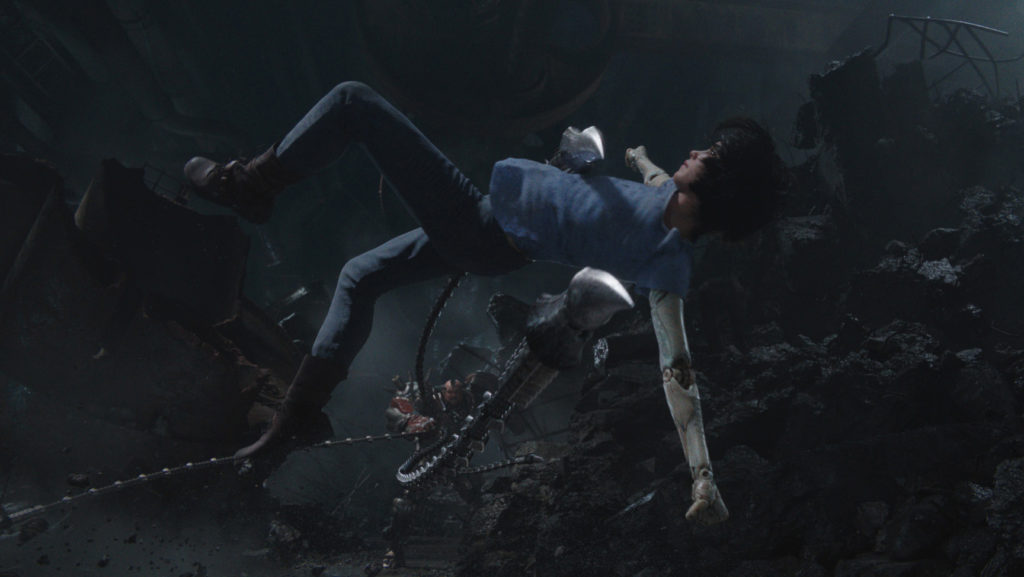“Alita: Battle Angel” wears its influences proudly — maybe a little too proudly.
Robert Rodriguez’s sci-fi action romp traffics heavily in sci-fi tropes, a tactic which is understandable. It’s based on “Gunnm,” the early ’90s manga by Yukito Kishiro. But it’s been nearly 30 years since this neon-coated, android–populated brand of sci-fi inspired anything other than fatigue. It’s only been a year since “Altered Carbon,” a little under two since the ill-advised, Americanized take on “Ghost in the Shell.”
And along comes “Alita,” offering a passable rendering of this age-old tale. Set 500 years in the future, the film kicks off with Doctor Dyson Ido (Christoph Waltz) discovering Alita (Rosa Salazar), a broken, ancient android with no memories of her past. Dyson repairs her and adopts her as his daughter. Their familial bond is quickly spoiled; Alita draws the ire of Vector (Mahershala Ali) and the upper–class inhabitants of Zalem, a floating paradise looming over Dyson’s dingy hometown, Iron City.
Written in part by James Cameron, “Alita” follows the titular cyborg on her journey of self-discovery and robot destruction. Moments of joy and wonder peek through — watching Alita try new foods and meet Iron City residents is exhilarating thanks to Salazar’s boundless exuberance. But more often than not, the film is too tethered to the sci-fi stories that came before it.
And then there is Rodriguez’s aesthetic influence. Much of “Alita” looks like an update of “Spy Kids 3-D: Gameover”: Iron City is a chunky, clunky mishmash of sour neons and sickly pastels.
Only Alita escapes design hell. Her computer–enhanced facial features sometimes stumble into the uncanny valley, but those moments are brief. Weta, the famed special effects house, renders Alita to appear mostly human save for her large, expressive eyes. She swaps between metal bodies partway through the film — the first of which looks like embossed ivory and the second like an exposed purple microchip. Both are just “off” enough to remind us that Alita is not human, but not so alien that we disengage.
Unfortunately, her personality only goes CGI-deep. She’s a traditional anime protagonist: bold when she needs to be and naive the rest of the time. Worse, Alita is positioned as a strong female character but is undermined by narrative choices that see her ceding agency at every turn. Most notably in a scene where Alita offers her heart — the source of her superpower — to her human boyfriend, Hugo (Keenan Johnson). There’s a dissonance between the kick-ass Alita we see in battle and the foolish one we’re given the rest of the time.
The supporting cast of the super-cyborgs look like accidents at the toy factory and have personalities to match. They bark bland threats — “I’m gonna crush you” — and flex their metal muscles before Alita spectacularly dismantles them in a swirl of glowing silver. They’re hard to take seriously and harder to find threatening. Vector doesn’t fare much better; Ali tries on his best “Matrix” impression, goofily deadpanning every monotone line. An over-the-top, goofy punk aesthetic worked in Rodriguez’s children’s movies but doesn’t serve a more intense, brutal world.
And “Alita” is capital-B brutal. Hardly five minutes pass without some poor soul losing an arm, leg or both to roving bounty hunters or deranged uber-criminals. Alita does her fair share of the limb-liberating and is at her best when she slices steel. One of the few empowering moments comes from one such scene in which Alita, battle–worn and broken, thrusts her arm into an enemy’s eye, silencing him midmonologue. An entire movie’s worth of catharsis is packed into a single strike, and the film’s only f-bomb, which immediately precedes it. But the rest of the action, though violent, is comparatively tame — Alita dispatches her foes with tension-quashing ease.
Action aside, the draw of dystopian stories is the philosophy behind the fights. “Alita,” however, is devoid of commentary. Iniquity abounds in Iron City. Rampant poverty and corruption are present but are little more than sci-fi garnish. Even questions of identity, memory and humanity are absent: an odd choice in a movie about an android’s soul-searching quest. What perspective does “Alita” offer? Fist fights are fun, swords are cool, and buzzsaws are neat.
There’s comfort in familiarity, but there’s boredom, too, and “Alita” doesn’t do enough to shake the feeling that we’ve seen it all already — because we have, many, many times before.




















